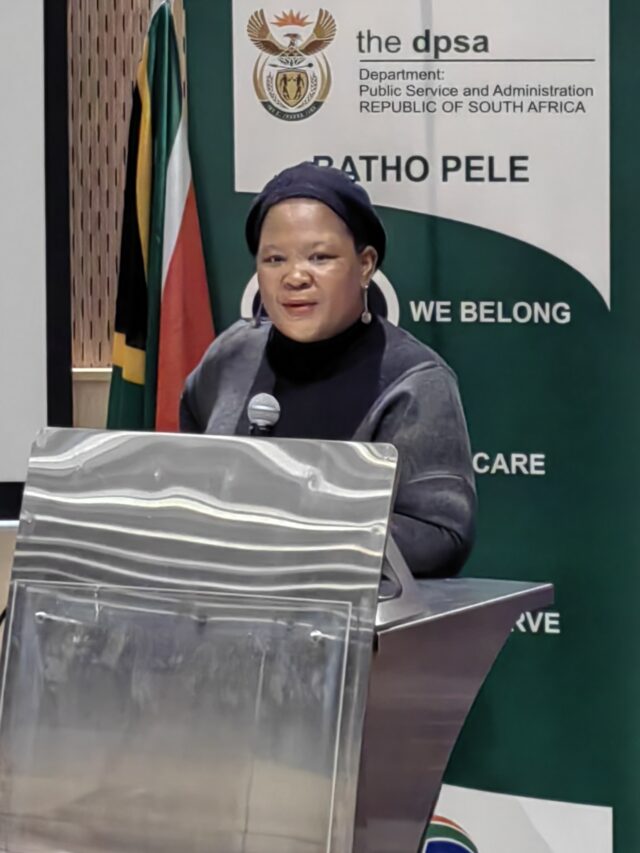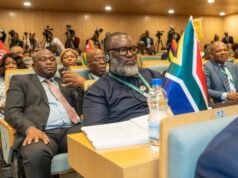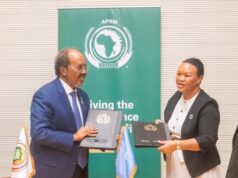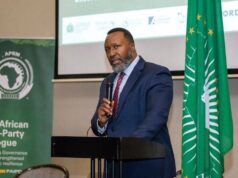The Director-General of the Department of Public Service and Administration (DPSA), Ms Yoliswa Makhasi, has emphasized the significance of the Gender Equality Project Plan as a roadmap for implementing the Gender Equality Seal and addressing societal challenges within the public service.
The DPSA is collaborating with the United Nations Development Programme (UNDP) to implement this plan.
To initiate the pilot project, the DPSA held a meeting today with heads of departments nominated for the Gender Equality Seal Project at the DPSA Batho Pele Offices in Pretoria.
Ms Makhasi highlighted that the Gender Seal is an integral part of broader interventions aimed at reforming the public service to effectively address societal challenges.
The objective is to ensure that the Gender Seal is practical and leads to institutional reforms that promote sustainable gender equality across the public service.
Ms. Makhasi also emphasized the five key dimensions of the Gender Seal, which provide clear performance standards to accelerate the integration of a gender perspective in the public sector.
The pilot phase of the project aims to promote gender mainstreaming and foster a culture of equality within public institutions.
Ms Makhasi expressed gratitude to the UNDP for their support and acknowledged the significant progress made in this project. She also mentioned the professionalization of the public service as another project that is making great strides.
The primary aim of the meeting was to secure the commitment of the participating departments and provide them with the necessary support for successful project implementation.
Mr. Gabriel Dava, Deputy Resident Representative of the UNDP, emphasized the importance of advancing gender equality and women’s empowerment within the public service.
He invited South Africa to join the global movement and showcase its progressiveness on the world stage, highlighting the benefits of participating in the program, including enhanced efficiency, improved working environments, and the maximization of human resources.
He stated that the Gender Equality Seal will serve as a roadmap for South Africa’s public institutions to accelerate programs towards gender equality while also strengthening service delivery and accountability to national development goals.
He commended Ms Makhasi and her team for their remarkable commitment to the program and assured continued support from the UNDP. He also emphasized the need for public institutions to have the technical capacity and personnel to drive the transformative process of the Gender Seal.
Mr Dava appealed to departments to ensure that gender equality is included in their respective departmental budgets, as this is crucial for sustaining the gains of the gender equality process.
He urged the participating departments to embrace the opportunity and maximize its potential.
The collaboration between the DPSA and the UNDP underscores the shared commitment to advancing gender equality and empowering women in the public sector.
During the pilot phase, the selected departments will go through various steps of the Gender Equality Seal Project, including finalizing institutional arrangements, building departmental capacity, and developing action plans.
The event concluded with the signing of commitment letters by the participating departments.
Selected national and provincial departments will participate in the pilot phase of the Gender Equality Seal Project.
At the national level, the following departments have been chosen: the Department of Public Service and Administration, the Department of Justice and Constitutional Development, the Department of Higher Education and Training, the Department of International Relations and Cooperation, the Department of Employment and Labour, the Department of Public Works and Infrastructure, the Department of Health, the Department of Women, Youth and Persons with Disabilities, the Department of Transport, and the Department of Trade Industry and Competition.
At the provincial level, the participating departments are as follows: the Office of the Premier in Eastern Cape, the Department of Social Development in Free State and Gauteng, the Office of the Premier in KwaZulu Natal and Limpopo, the Department of Public Works, Roads, and Transport in Mpumalanga, the Office of the Premier in North-West and Northern Cape, and the Department of Health and the Department of Environmental Affairs in Western Cape.
These departments have demonstrated their dedication to implementing the Gender Equality Strategic Framework and utilizing its associated tools.
The pilot project aims to foster gender mainstreaming within these departments, and it will involve various steps to achieve this goal.
These steps include capacity building, self-assessment, action plan development, and a final assessment.
Through their participation in the pilot phase, these departments will work towards integrating gender equality principles and practices into their operations and policies.
The project will provide them with the necessary support and guidance to develop effective strategies for promoting gender equality within their respective spheres of influence.









